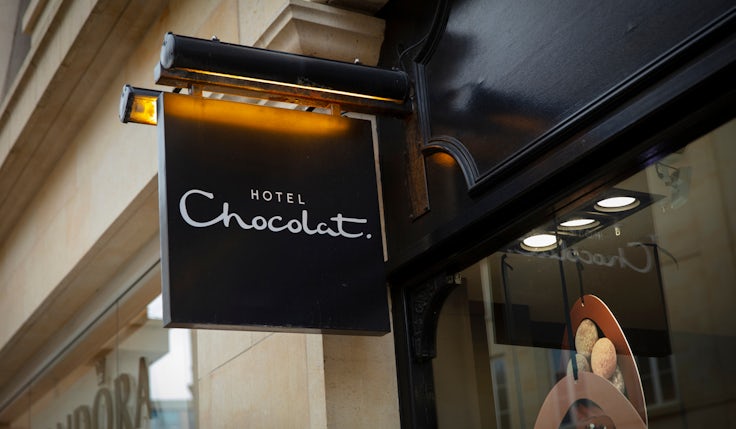Is Mars the answer to Hotel Chocolat’s global expansion woes?
The loss-making chocolate brand has been bought by Mars for £534m, as its new owner looks to boost its premium appeal.
 Hotel Chocolat has been sold to Mars in a £534m cash deal. The confectionery giant is paying a premium of 169.8% for the brand, with its sale price coming in way above its current 139p share price.
Hotel Chocolat has been sold to Mars in a £534m cash deal. The confectionery giant is paying a premium of 169.8% for the brand, with its sale price coming in way above its current 139p share price.
The premium chocolate brand has been struggling of late. Despite business looking promising in 2021 thanks to a digital-led marketing strategy, it reported a full-year loss of £800,000 in July, which it blamed on inflationary pressures and restructuring costs. Revenues were also down 10%, whole it recorded a pre-tax loss of £6.9m.
Hotel Chocolat’s attempts to expand overseas have so far been unsuccessful, with its aborted plans to expand in Japan and the US contributing to its recent poor financial performance. However, as part of this acquisition, its new owner is positioning itself as the force to take Hotel Chocolat global.
Hotel Chocolat dials back ‘digital-led’ strategy to focus on store growth
“We know our brand resonates with consumers overseas, but operational supply chain challenges have held us back. By partnering with Mars, we can grow our international presence much more quickly using their skills, expertise and capabilities,” says Angus Thirlwell, CEO of Hotel Chocolat who will be staying in his current role as part of the deal.
He adds that the pillars of the Hotel Chocolat brand, “originality, authenticity and ethical trading” are what have brought the two businesses together.
“Hotel Chocolat’s brand destiny is to become a leading premium chocolate brand in major markets through reinventing chocolate for people and nature. In Mars we have found a true meeting of minds – in strong cultural values, bold strategy and true long-termism,” he says.
What’s next?
Hotel Chocolat was the UK’s biggest independent chocolate maker before the sale. It experienced rapid digital growth during the Covid-19 pandemic, which saw it attempt to change tact and move towards a digital-focused strategy, rather than being bricks and mortar based.
In March this year, the business began dialling back on its digital-first approach, reporting that it was seeing almost double the frequency of store shoppers compared with those buying online, in part thanks to its database marketing and loyalty scheme. It also claimed, at the time, to have hit its highest brand consideration level on record. The brand is not currently being tracked by YouGov’s BrandIndex.
Hotel Chocolat hails evolution to ‘digital-led brand’ as profits soar
Annie Brown, general manager for UK Consulting at Brand Finance says the sale signifies a “major transition” for Hotel Chocolat, which will allow it to address previous operational and expansion challenges. “Like many smaller British brands, despite Hotel Chocolat’s strong brand and unique marketing, funding, investment and time are essential for the brand to grow internationally,” she tells Marketing Week.
“The deal, which positions Mars to enhance Hotel Chocolat’s growth and overseas presence while preserving its entrepreneurial essence and product quality, also reflects a strategic move by Mars to diversify and strengthen its portfolio with a premium, established UK brand with its own retail presence,” she adds.
However, she cautions Mars against falling victim to similar problems faced by competitors such as Ferrero and Mondelez. The former’s acquisition of Thorntons, and the latter’s ownership of Green & Blacks, have been nothing to shout about, she says, with both brands falling below expectations.
“Ultimately, changes in ownership or acquisition can work extremely well if there is a good understanding of the brand, its culture and drivers of customer demand. However, where these aren’t in place, these brands can face difficulties,” Brown concludes.






Comments